
Konya Shamsrumi: What is the process of writing a poem like for you? Is it a lot of hard work or easy?
Chinua Ezenwa-Ohaeto: To answer this, I think I should first tell a story about how I started writing. As a kid, I wanted to be known for an invention, like Graham Bell, Galileo Galilei, Thomas Edison… you know? I wanted the sort of situation where students would be asked who invented this and they would chorus, “Chinua Ezenwa-Ohaeto!” just like I chorused famous Inventors in my class. I set my mind to inventing a wristwatch that could serve as a monitor: a sort of television. This idea died when I saw a palm-sized device used in monitoring a criminal in a movie. I went to my Dad and asked him to buy me one. After a six-month stay in Germany, he came back home with one, exactly as seen in the movie. That was how my Inventor dreams died.
I turned my attention to drawing and painting up until I stumbled on my father’s collection The Voice of the Night Masquerade (Kraft Books, 1996). I was marvelled by it, struck by the use and placement of its words. So, I scribbled a few lines and showed them to him. He said, “Chinua, this is my work. Just go put down your own feelings.” That is what I have been doing. I started writing anything that came into my head. I didn’t mind the grammar, the punctuations… I just wrote. In time, I started maturing, understanding form, reading so many books. Writing poems to this stage in my life is sort of self-taught and a great deal of learning for me. I understudied most poems I came across.
That said, the background having been set, the process of writing a poem is both hard work and easy. Let me explain. I should like to say that it takes me close to three months to write apoem I am satisfied with. When I say it is hard work, I mean when I want to or have been told to apply a particular style or given a time frame to put up a poem or when I want to write on a particular theme given to me. So, it is hard work to me in such a situation. I have to make sure the emotions are right, my message accurate, and the style well used, good metaphors and imagery employed and my diction good.
When the process is easy, I mean taking my time to put it up piece by piece the way I want, writing it as I feel it, as it comes to me. Then style comes in later, during the editing stage. I have a notepad where I put down phrases, words, clauses, expressions I like and pick up from books, from conversations, from movies, from friends or highlife music and people on the street. This notepad is a process to me; sometimes I make up a poem by putting together the things in my notepad. Writing a poem is easy for me when I sit before my desk and write down my memories, the people I have met and the things I wish for. It is easy when I discuss my happiness and my pains, when I talk about you and I.
Konya Shamsrumi: Please describe your sense of identity in this or any possible world in imagery or metaphor?
Chinua Ezenwa-Ohaeto: I am an African, that’s an Identity. I am a Nigerian, that’s an Identity. I am Igbo, that’s an identity. I am Imo, that’s an identity. I am from Okoro Obashi in Imo, that’s an identity. I am a boy, that’s an identity. I am Dr. Ngozi Ezenwa-Ohaeto, that’s an identity. I am Ezenwa-Ohaeto, that’s an identity. I am Chinua, that’s an Identity. I am a poet, that’s an identity. All these I have mentioned, I assume all of them and they make me who I am. My identity.
Identity is important: you know where you coming from, you know where you are heading to. And, most of all, you know what you want and what you are writing for. Identity defines a person. To mention a few pointers: culture, thinking processes, relationships, behavior, country, region, religion and their output, in its very many forms. In my case, the output of my identity is my poetry. My poems, the few published online, reflect this.
I cannot talk about identity without mentioning my family: my mum, Dr. Ngozi Ezenwa-Ohaeto, and siblings, Nnedi, Onyii and Uche. They have had a part in shaping me for theyears I have spent with them. For sharing my bed and clothes with me. For supporting me. For understanding my person and still loving me. For eating my food when I am busy writing in my room. For locking ourselves inside a deep freezer because we wanted to know what it felt to be in a cold country. For the laughter and for calling me brother and son.
I must mention friends too, they too inform my identity: Muna Tassie, Tolulokpe Oke, DamiLare, Olisa Eloka, Amaka Kelechukwu, Nancy Mbonu, Chioma Asika, Rasaq Malik Gbolahan, Ngozi Ohaeto, Florida Ohaeto, Laura Chizaram, Diana Modeme, Ebuka Igiji, Saddiq Dzukogi, Vivian Uzor, Ngozi Marion, Mark Anthony Osuchukwu, Taiye Ojo, Star Okpe, Ifeyinwa Nwofor, Solution Kingsley Ogueli, Lucia Bonila, Alan Mendoza, Anita Nnanna, Adaeze Ozoagu, Chiedozie Nwaogwugwu, Ibe Mmesoma, Muna Chuma-Udeh, Unoma Azuah, Yvonne Udeh, Ifechukwu Anyamaene, Ofunne Kpakpando, Uche Mmuo and many others.
The poets and writers I have read and read are also part of my identity, they include: Charles Bukowski, Mahmoud Darwish, Leila Chatti, IIya Kaminsky, Donika Kelly, Theresa Lola, Chris Abani, Rasaq Malik Gbolahan already mentioned, Romeo Oriogun, Logan February, Soonest Nathaniel, Warsan Shire, Gbenga Adesina, Saddiq Dzukogi, Helen Oyeyemi, Chimamanda Ngozi Adichie, Adimchinma Ibe, Innocent Ilodianya, Dennis Levertov, Mai Der Vang, IIya Kaminsky, E. C. Osondu, Caleb Somtochukwu, Okwudili Nebeolisa, Danez Smith, Chen Chen, Sarah Lubala,Taiye Ojo, Dami Ajayi, Natasha Oladokun, Chika Unigwe and Izuchukwu Udokwu.
In another view, I understand that Identity is shaped by a sense of history and place. And because I have assumed my history by embracing my memories, where I live and come from, expressing myself in poetry, I believe my sense of identity has been defined.
Konya Shamsrumi: If any of your poems could literarily save a person’s life, which poem would it be and can you describe the person whose life you think it would have saved?
Chinua Ezenwa-Ohaeto: If any of my poems can literarily save a person’s life, it should be this poem, published by Praxis Magazine two yearsago:
Today I Become Me
Today I become me,
the stone, the water, the air, the fire: the one
after I have been many, many things:
I have been a child who opened his eyes when you closed yours;
I have been a writer who wrote many novels in titles only;
I have been a priest who baptized children with the names of poems;
I have been tomorrow, I have been yesterday;
I have been one who bought a house in his dream and ate there with his siblings;
I have been a country, and was denied the status of its president;
I have been my father’s only brother: near-less and far-less;
I have been you, I have been them;
I have been the tears of every Igbo girl in love;
I have been a poet who was only ordained by Paz;
I have been a twisted woman under a twisted tree;
I have been the truth stranger than fiction;
I have been up, I have been down;
I have been the questions you didn’t know the answer until when asked;
I have been Mayakovsky who wrote and wrote, and then wrote with a gun;
I have been a book’s page and read that I killed myself;
I have been the adverb in every Nigerian’s sentence;
I have been here, I have been there.
I wish it could bring my dad, Professor Ezenwa-Ohaeto, back to life. There is a lot of information about him online. But one thing which no one will find anywhere (online) is that he was a man of big heart, a father who was there for everyone, a man of jokes and books. A man of love and smiles. I wrote the poem when I felt weighed down by what my life without my dad was, what it would have been with him alive.
The poem was about me agreeing to my situation and predicament. The line “I have been a child who opened his eyes when you closed yours” was me assuming control and not being weighed down anymore by my dad’s demise. It was sort of carrying on with life yet treasuring the memories of him I have.

Konya Shamsrumi: What does Africa mean to you, as potential or reality?
Chinua Ezenwa-Ohaeto: Africa is my identity. And, in reality, I am Africa’s identity. This space, Africa, is what I occupy. Denying it is telling myself a lie. Though, “Africa” has no single perspective and I cannot assume all its perspectives which may come in many forms: by region, by language, by religion, by politics, by country etc. I assume this singular perspective: by country― Nigerian.In detail, I am poet who happens to be an African, living in its western area, in Nigeria. I believe this makes it more definite.
There has been a lot of debate as to who is an African writer (poet) and what Africa means to someone. There are two faces to this issue:
- Does it mean being born in, living in, and writing exclusively about Africa?
- Does it mean not really born in, yet having African descent and writing but not writing exclusively about Africa?
To me, these labels, “Africa” and “African Writer” have their limitations, which can range from what a writer should write and shouldn’t write about, or do and shouldn’t do. But that’s not something I alone should discuss.
Konya Shamsrumi: Could you share with us one poem you’ve been most impressed or fascinated by? Tell us why and share favorite lines from it.
Chinua Ezenwa-Ohaeto: It’s very hard to choose. Really. There are many poems I have read and have been so impressed by. The poets I mentioned already impress and fascinate me greatly. Because I have to choose, I will go with Saddiq Dzukogi’s What The Poem Said. Published in Glass: A Journal of Poetry. I choose it because his poem is the first that came in mind when asked the question. Maybe, it’s because I only recently read it?
I am impressed by this poem for its metaphors and directness and vividness. When I was reading it, I felt just like he must have felt when putting it together. One thing I admire is his voice, the calmness that comes with it. Awesome!
Here are the lines from the poem I often remember, the lines:
the poem says I am cold hearted, a tree
no one is able to climb, that my face is broken and is in many places like twigs
making sense of a wind-wave, the more reason
I am loved is because looking into every enemy
you’ll find something to love.
Another part:
The poem says in my eyes is everyone who will die
my ears burn in what the poem says
the poem burns, until I transmute into something
half-formed in what the poem says
Another reads:
Says if I stay long enough on a spot
my feet will become roots
and I’ll be unable to leave.
In all, I cannot wait to have in my hands a full collection from Saddiq Dzukogi.
Chinua Ezenwa-Ohaeto (@ChinuaEzenwa) won the Association of Nigerian Author’s/Mazariyya Teen Poetry Prize in 2009. He also won the Speak to the Heart Inc. Poetry Competition in 2016. He was a runner-up for the Etisalat Prize for Literature (flash fiction) in 2014 and won the Castello di Duino Poesia Prizefor an unpublished poem in 2018. He is the recipient of New Hampshire Instituteof Art’s 2018 Writing Award; also a recipient of the Institute’s 2018 MFA scholarship. His work has appeared in Lunaris Review, AFREADA, Raffish Magazine, KalahariReview, Palette, Knicknackery, Praxis Magazine, Bakwa Magazine, StrangeHorizons, One, Ake Review and Crannòg magazine.






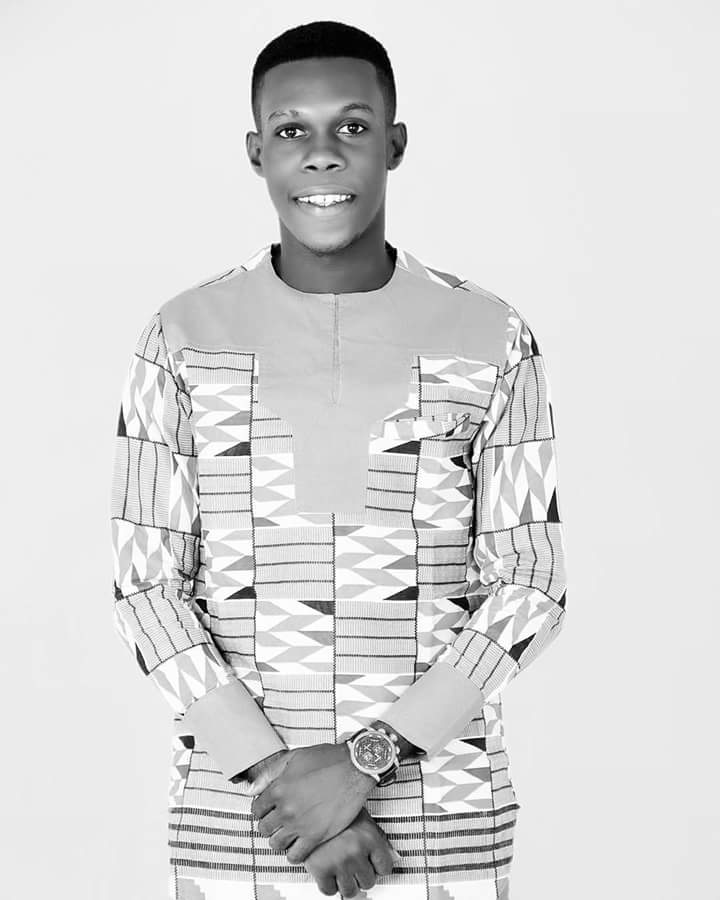
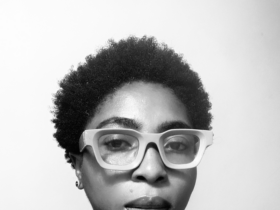
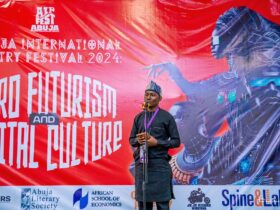
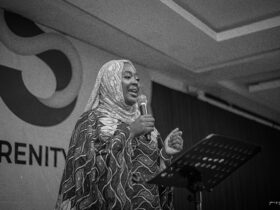
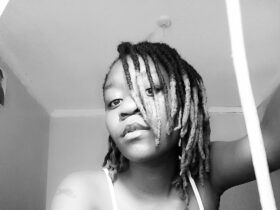
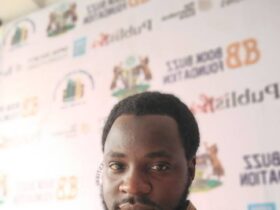

Leave a Reply